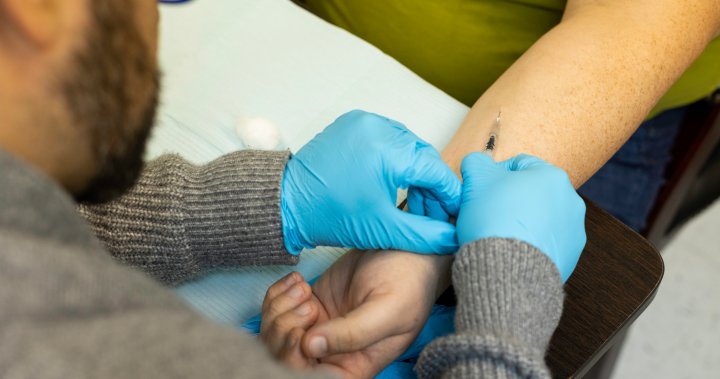A single dose of the mpox vaccine offers moderate protection against the virus, according to a new Canadian study. While “moderate” might not sound impressive, the researchers describe the results as “terrific” and hope more Canadians at risk will continue to get vaccinated.
The study, published Wednesday in the BMJ, found that a single dose of the Modified vaccinia Ankara-Bavarian Nordic (MVA-BN) was 58 per cent effective in protecting against the mpox infection.
No randomized clinical trials have yet been conducted to test the effectiveness of vaccination against mpox. Previous estimates, based on observational studies, suggested that a single dose of the vaccine could be anywhere from 36-per cent to 86-per cent effective, the study said.
“It’s important because prior to the emergency use of this vaccine to try and reduce infections during a global outbreak that also affected Canada, there was no previous clinical trials to tell us how well this vaccine might work in the real world during an outbreak,” said Dr. Sharmistha Mishra, the study’s co-author and associate professor in the Department of Medicine at the University of Toronto.
“We had a lot of data on safety with this vaccine, but not very much data on how well it would work. It was rolled out in an emergency situation, and because of the type of data infrastructure and health-care system we have in Ontario, we were able to finally take a look and see how well it actually worked,” she told Global News.
The vaccine is typically given in a two-dose regimen, 28 days apart, to protect against mpox. However, this study did not examine the effectiveness of the second dose.
The MVA-BN vaccine is a smallpox vaccine introduced after the global mpox outbreak was declared a public health emergency in July 2022.
In Ontario, the vaccine was initially introduced in June 2022 as post-exposure for high-risk contacts and pre-exposure for gay, bisexual, and other men who have sex with men, as well as sex workers at high risk of exposure, the study said.
Although approved as a two-dose series in Canada, Ontario initially used a single-dose strategy due to limited supply, later switching to a two-dose program by September 2022.

Get weekly health news
Receive the latest medical news and health information delivered to you every Sunday.
Before the outbreak, data on MVA-BN’s effectiveness against mpox were limited. But the researchers of the BMJ study aimed to provide a more accurate estimate of the effectiveness of one dose of MVA-BN against mpox infection in a broader population using a target trial.
To do this, the researchers looked at total of 3,204 men who received the vaccine and were matched to 3,204 unvaccinated controls. Over the study period between June 2022 and October 2022, 71 mpox infections were diagnosed, 21 in the vaccinated group and 50 in the unvaccinated group.
“We wanted to find out how effective the vaccine that was rolled out in 2022 in Ontario was at preventing an infection among those who were highest risk of being infected with mpox,” Mishra said. “We found that among folks who were vaccinated, there was a 58-per cent reduction in the risk of infection.”
While 58-per cent effectiveness might not seem high, Mishra said these results are still very promising, calling them “terrific.”
“It showed us that when something is as effective as 58 per cent, particularly when an outbreak is emerging, it could have a really large impact, especially when it’s combined with other measures to try and reduce transmission and infection,” she said.
With mpox infections rising again across the globe, the researchers said these findings “strengthen the evidence that MVA-BN is effective at preventing mpox infection and should be made available and accessible to communities at risk.”
On Aug. 14, the World Health Organization (WHO) declared mpox a global public health emergency for the second time in two years, following an outbreak of the virus in parts of Africa.
Around the same time, Ontario health officials warned of a sharp rise in mpox cases in the region.
Originally identified in monkeys in 1958, mpox, previously known as monkeypox, was primarily confined to central and western Africa, and transmitted through close contact with infected animals.
However, a shift occurred in 2022 when the virus spread rapidly among people worldwide, including Europe, North America and beyond.
Mpox belongs to the same family of viruses as smallpox and causes similar, but generally milder symptoms. Common symptoms of mpox are a skin rash or mucosal lesions which can last two to four weeks accompanied by fever, headache, muscle aches, back pain, low energy and swollen lymph nodes, the WHO reports.
Mpox is caused by two distinct genetic variants or clades: Clade I and Clade II. Clade II, which generally causes less severe infections, was responsible for the global outbreak that began in 2022 and is the variant circulating in Canada.
Clade I, a more concerning strain that leads to more severe disease and higher mortality rates, is now spreading beyond Africa. This clade, recently identified in sexual networks, has been detected in countries like Kenya, Rwanda, and Sweden — nations that had never reported mpox cases before.
The MVA-BN vaccine has only been studied in Ontario, where the Clade II strain of mpox is present. But the researchers are hopeful it still has effectiveness against Clade I.
“We don’t know if this vaccine will be as effective, but we were facing the same situation back in 2022 in terms of the information we have. So there’s not a lot of reason to think that it wouldn’t be as effective. But we don’t have that information yet because the vaccines have been implemented in that setting of phase one yet,” Mishra said.
© 2024 Global News, a division of Corus Entertainment Inc.


